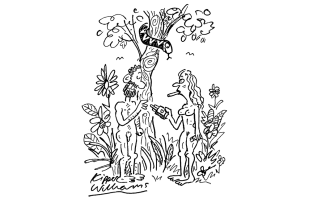Pensioners at risk
Sir: Douglas Murray wonders what would have happened if a Conservative chancellor had announced the removal of the winter fuel payment (‘Labour’s age of miracles’, 31 August) and speculates about the reaction. No such speculation is needed: the Conservative manifesto of 2017 stated that it would means test this benefit, as Labour is now doing.
The Labour party’s reaction was to publish research stating that up to 4,000 pensioners’ lives would be at risk and add that ‘pensioners in our country will struggle to heat their homes’ (the then shadow chancellor John McDonnell, as widely quoted in the press). No journalist has yet put this to the government. Does the government agree with its party’s research then, and if not, how is it different now? Will pensioners struggle to heat their homes?
Similarly, the Conservative 2017 manifesto pledge to change social care arrangements was howled down as a ‘dementia tax’. The Labour proposal in the same fiscal statement as the one cutting the winter fuel payment did something similar. This has received even less attention than the fuel benefit. Perhaps Douglas would have done better to wonder at the non-reaction to this.
Trevor Pitman
Beckenham, Kent
Letby and statistics
Sir: I fear that Rory Sutherland has fallen for the myth that Lucy Letby was convicted because of ‘statistics’ (The Wiki Man, 31 August). Once it was established that someone was deliberately harming children on the ward – a fact that Letby herself conceded – it was highly relevant that she was the only person who was always present. Other evidence presented at the trial, such as her falsification of medical records, strengthened the case but none of this had anything to do with statistics. The jury did not spend ten months staring at a staff rota.
Proving that the defendant was at the scene of the crime is a necessary condition for a conviction but, as Letby’s acquittal on several charges shows, it is not a sufficient condition. If 12 statisticians had been on the jury, she still would have been found guilty.
Christopher Snowdon
Shoreham-by-Sea, West Sussex
Disadvantaged white boys
Sir: The excellent Barometer feature last week (24 August) demonstrates the power of data presentation: it makes it clear for all to see that white male students who qualify for free school meals (the largest cohort in the entire free school meal group) are the least likely to progress to higher education.
Over many years, I have noticed the complete reluctance of universities and learned societies to even collect such statistics. This reflects the worrying and continued lack of attention given to disadvantaged white working-class boys compared with other groups.
By targeting this inequality, the new education secretary could help to release the huge untapped potential of this large group of young people. To do so would also help assuage the threat of destabilisation of our society – a threat that appears, from the recent riots, to be real.
Peter Edwards FRS
Emeritus Professor of Chemistry, Oxford University
Not Rhodes’s war
Sir: Matthew Parris is fully entitled to champion Afrikaners, but he should not peddle the lie that Cecil Rhodes fomented the Boer War (‘Afrikaners have been endlessly maligned’, 31 August). There is no evidence that Rhodes did so, and why should Whitehall have listened to him anyway? Sir Alfred Milner, the high commissioner, was responsible for pressuring the British government, and his motives were complex and probably controversial.
Nor is it fair to imply that the concentration camps were designed to exterminate the Boers. Thousands died, but from disease, not because they were executed, and the British government authorised a report into the causes and made changes remarkably quickly. Those of us who know the words to ‘Ag pleez daddy’ salute Afrikaans and Afrikaners, but let’s stick to the truth.
Tony Porter
Fleckney, Leicestershire
At the intersection
Sir: In his review of Frank Furedi’s The War Against the Past (Books, 31 August), Jonathan Sumption takes the author to task for ‘failing to understand the mentality of those whom he is criticising’ (i.e. academics who try to discredit the history of the West), and for going ‘off-piste’ from this subject ‘to pursue other targets, such as gender-neutral vocabulary, trans ideology or dogmatic modernism, none of which has much to do with the discrediting of western culture’. I am a mature doctoral student at one of the UK’s leading Russell Group universities (in its School of History), and I can tell Lord Sumption that if he were only to read even the titles of innumerable courses, lectures, conference papers, articles and books now being taught and published, he would realise that the mentality he refers to encompasses precisely those things, and more. They call it ‘intersectionality’.
Ian Shiels
Bramley, Leeds
Four Yorkshiremen
Sir: The Four Yorkshiremen sketch referred to by James Delingpole (Arts, 31 August) is yet again credited to Monty Python. It actually originated in an earlier (ITV) comedy called At Last The 1948 Show. Admittedly Cleese and Chapman were in it, but the other two ‘Yorkshiremen’ were Marty Feldman and Tim Brooke-Taylor. The sketch never featured in the Python
TV series.
Simon Broad
Sawston, Cambridgeshire
Shrinkflation
Sir: I must take issue with Martin Vander Weyer over the inflation figure (Any other business, 31 August). I am frustrated that no one is talking about ‘shrinkflation’. Items such as chocolate bars are smaller. The most recent example is Greek yogurt which is more obvious as the tub is the same size, but only contains 450g instead of 500g! Cream cleaners have been diluted. All of these ruses together mean that we are getting much less for our money – hence I would argue that inflation is much higher than 2 per cent.
Robert Duffield
Tenby, Pembrokeshire
Not terminated
Sir: Deborah Ross is quite right to praise James Cameron’s Terminator (Arts, 31 August) but quite wrong to listen to those who say the follow-up films are not worth seeing. As most critics attest and a couple of the comments beneath her article suggest, Terminator 2 is, like Godfather 2, as good as or even better than its precursor. As well as the script, direction, acting and action sequences being first rate, there is a handling of the themes of loss and grief which is better than most manuals can provide (I speak as a therapist).
Hugh Hetherington
Sandwich, Kent
Poor taste
Sir: I hope Tanya Gold is right about the declining fashion for tasting menus (Notes on…, 31 August). In 1980s France restaurants confined them discreetly to the bottom corner of their huge cards: le menu surprise. Then chefs became media stars and the power relationship between kitchen and dining room reversed. I found their nadir at a three-star restaurant in the Napa Valley, with a compulsory surprise menu and waiters who refused to tell me what I was about to eat. If sanity is returning, so that I can again make my own selection of food in decent portions, I am with Tanya: this is good.
John Hicks
Manchester
Cross purposes
Sir: Lloyd Evans points to the apparent hypocrisy in the Jesuits’ ‘passion for ceremonial duties’ that he observed as an altar boy, as the reason for his teenage conversion to atheism (No life, 31 August). Perhaps he should look again at the remarkable work of churches of all denominations across the world. In this country, food banks, kitchens, parent and toddler groups, youth clubs, holiday clubs, summer camps, groups for the elderly, pastoral care for the housebound and those in care homes, and debt counselling centres are all run by churches, often by volunteers with no state funding, simply because they believe in a God who came ‘not to be served but to serve and give his life as a ransom for many’.

In an article a number of years ago, Matthew Parris made a similar point: ‘Now a confirmed atheist, I’ve become convinced of the enormous contribution that Christian evangelism makes in Africa: sharply distinct from the work of secular NGOs, government projects and international aid efforts. These alone will not do. Education and training alone will not do. In Africa Christianity changes people’s hearts. It brings a spiritual transformation. The rebirth is real. The change is good.’
Richard Coombs
Rector of Cheltenham, Gloucestershire
That’s projecting
Sir: Yelling with such precision that the sound carries all the way to the cheap seats might be a lauded skill, but it’s hardly natural. What Rupert Christiansen calls ‘electrically powered artifice’ (‘Magic mic’, 31 August) has brought heightened levels of naturalism, intimacy and collusion to theatres and is largely responsible for the creative renaissance that audiences are enjoying in ever-larger numbers. Theatrical sound design is easily the best gig going, combining the most interesting and dynamic aspects of maths, perception and meaning, and UK practitioners are at its forefront.
Dr Tom Parkinson
Liverpool
Slippery slope
Sir: Ayaan Hirsi Ali’s enlightening article ‘Unspeakable truth’ (31 August), could have rounded off with a challenging question: how are the near-certain consequences likely to flow from the new Labour government’s plan to ‘build on the Online Safety Act’ different to the restrictions undemocratically imposed by dictatorial leaders in other nation states?
As several MPs have already cautioned, the act’s current regularity provision puts us at the top of this slippery slope and gathering pace.
David Blackwell
Chesterfield, Derbyshire
Capital losses
Sir: The redoubtable Ross Clark is, I suggest, both right and wrong about the ‘brain drain’ (24 August). A non-dom I know well and who is of working age tells me that all his circle of around 20 working friends have left the UK this year, and he is selling up to live in Milan. Not good.
Where Clark is right is about the increasingly discouraging financial climate for entrepreneurs in the UK. Quite apart from what Rachel Reeves may do to them in the Budget, the London Stock Exchange has become almost a no-go area for raising equity capital. Why? Because the LSE these days derives the overwhelming majority of its revenue from data collection, as opposed to its traditional servicing of its main and AIM cash markets. Hence there is no incentive for the LSE to put its best people on to providing flourishing capital-raising markets for our entrepreneurs.
A while back Ed Balls, on his joint podcast with George Osborne, suggested that the time has come to take the stock exchanges away from the LSE Group. Perhaps he should have a word with his missus now that she is in power?
Stephen Hazell-Smith
Penshurst, Kent
Alexander in India
Sir: The story of the spread of Indian culture is indeed impressive (Books, 31 August), but we should not forget that Indian culture had itself been influenced by the arrival of Alexander and by the subsequent Greco-Indian kingdoms. This is most clearly seen in Indian architecture and sculpture, but Alexander’s devotion to the Iliad, as the Greek national epic, may also have prompted the Indians to commit the Mahabharata to writing and make it their own national epic.
David J. Critchley
Winslow, Buckingham







Comments